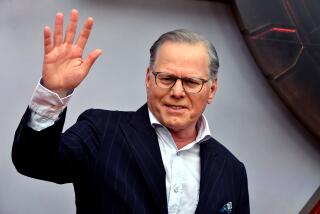THE TIME -- WARNER DEAL : Ross Celebrates Victory by Making Plans for Europe
- Share via
Once again, happiness is at Steve Ross’ fingertips.
The longtime Warner Communications chairman came to Los Angeles on the wings of victory and a corporate jet Monday night for a party at record producer Quincy Jones’ house, following the Delaware court ruling that cleared the way for Warner’s acquisition by Time Inc.
He spent Tuesday, his first full day as co-chairman and co-chief executive of Time Warner Inc., in meetings in a Beverly Hills Hotel bungalow, and on the spur of the moment granted an interview.
Sporting a “Batman” pin on his lapel, to honor Warner Bros.’ blockbuster film that has grossed $190 million at the box office, the 61-year-old executive had every reason to exult. But he talked most about competing in Europe, and he urged other American industrial leaders to follow the Time-Warner example in merging.
“The most exciting thing to come out of the Delaware court is that companies really have the right to combine . . . (and manage their businesses) for the long term, because without that, American companies are down the tube,” Ross said.
Seven grueling weeks have passed since Paramount Communications launched its surprise attack on the Time-Warner deal, threatening to undo Ross’ most patient handiwork. He had spent 2 1/2 years putting together a stock-swap merger with Time, which appeared certain to win shareholder approval until Paramount made its hostile bid for Time on June 6.
The Paramount bid forced Time and Warner to regroup. The two companies abandoned the stock swap for Time’s $14-billion acquisition of Warner, which would not require a shareholder vote. The maneuver outraged some Time shareholders but survived the courts, which ruled that directors have a right to manage corporations for long-term goals.
Laden With Debt
Under the revised deal, Warner is now a 58%-owned subsidiary, with the remaining shares expected to be acquired in the next three or four months once a formula of cash, stock or debt is negotiated.
The deal leaves Time Warner laden with debt that Ross would have preferred using for acquisitions, but on Tuesday he declared: “We’ll just have to do it in different ways, that’s all.”
Hollywood and Wall Street wags say Ross has every reason to rejoice. His old Warner employment contract entitles him to a $180-million payout, and he has been guaranteed the chairman’s title of the new company for the next decade.
But close associates insist that the deal means more than title and money to Ross, who built Warner into a glittering entertainment conglomerate from the unlikely origins of his in-laws’ funeral parlor business.
True, Ross is a product of Brooklyn who loves hobnobbing with Hollywood talent, but he has earned Wall Street’s respect for his business acumen. Ross steered Warner through severe losses in the early 1980s, when the video game industry collapsed, and repeatedly outwitted his largest and most dissident shareholder, Chris-Craft Industries, in the board room.
Ross demonstrated Tuesday that his solicitous attitude toward performers and producers won’t change, taking pains to explain that Quincy Jones’ party was not held in Ross’ honor but was instead a surprise birthday party for Jones’ close friend, Verna Harrah.
And Ross was cautious about outlining any plans for Europe, where he traveled recently as his lawyers girded for the Delaware battle.
“I don’t want to warn our own competition by saying: ‘This is what we’re going to do here,’ and ‘This is what we’re going to do here.’ ”
But boosting Time Warner’s overseas revenue is clearly a major objective.
Bleakest Moment
“You must be situated in Europe by 1992, because you’re going to have one country for all intents and purposes . . . (and) because in any industry, there’ll be a Bertelsmann,” Ross said, alluding to the West German publishing giant and 12 countries’ plan to form a single European market.
The Time Warner deal “puts us 50% larger than Bertelsmann, which is great,” Ross said.
As he reflected upon the events leading up to the merger, Ross said his bleakest moment occurred when Paramount Chairman Martin S. Davis telephoned his decision to make a cash bid for Time Inc.
“The sweetest moment was when we concluded the initial deal,” Ross said, with some wistfulness for the stock swap that would have avoided debt. (Ever the diplomat, he later added both the lower and appellate court decisions, as well as “today, because of the exciting future of Time Warner.”)
And there were funny moments, such as Monday, when Cable News Network lost its audio signal just as the Delaware Supreme Court panel announced its decision. Ross, who was watching the televised proceeding at his New York headquarters, said he held his breath, waiting to see which legal team would begin hearty, congratulatory handshakes.
His did.
More to Read
The biggest entertainment stories
Get our big stories about Hollywood, film, television, music, arts, culture and more right in your inbox as soon as they publish.
You may occasionally receive promotional content from the Los Angeles Times.










